Organized by Yu-Chen
Interview with Academics
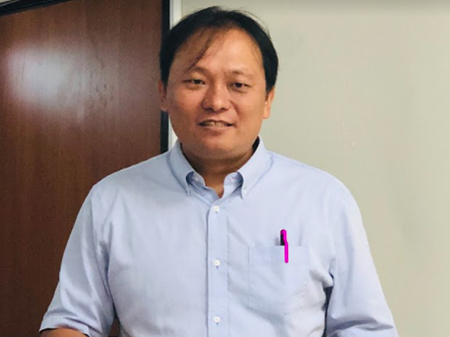 |
||
|
||
|
||
|
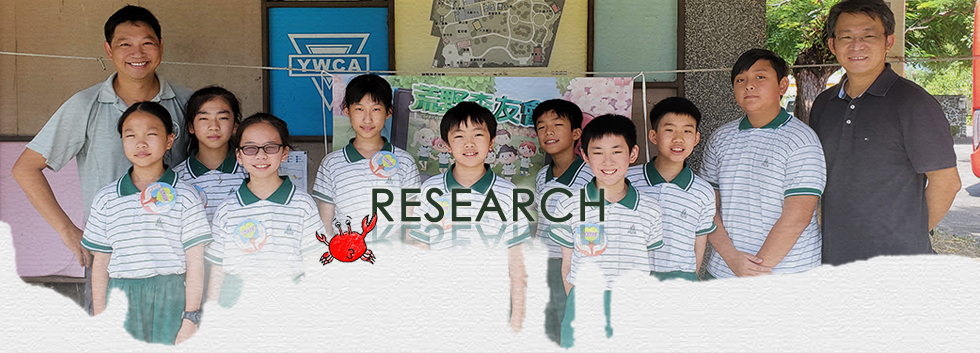
 |
||
|
||
|
||
|
| 1. | What’s your recommendation on how to implement marine education with the goal of “Get close to the Ocean, Love the Ocean, Know the Ocean” in elementary school? (I-Chia) |
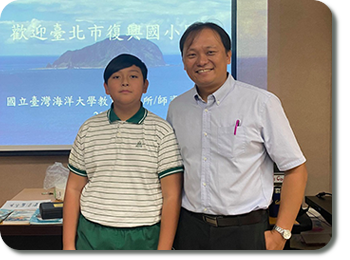
In 2018, the Ministry of Education formulated the National Ocean Policy White Paper, proposing marine education from the concept of “Get close to the Ocean, Love the Ocean, Know the Ocean”. We can increase ocean literacy through school, family, and society. In terms of school education, teachers must integrate marine education into every subject. The schools must have sufficient teaching staff and materials to encourage faculty members to plan and develop marine related lectures. The teachers can utilize the resources from Taiwan Marine Education Center and obtain certification for marine education. In terms of society, government owned institutions such as the National Museum of Marine Science and Technology and the National Museum of Marine Biology & Aquarium can also provide education to improve ocean literacy. In addition, there are various activities organized by corporations and civil groups that vowed to protect the marine environment. Every child is a seed of marine education. If we can influence our families and classmates and reach even further outward, marine education can become a norm in our lives.
| 2. | As an elementary student, apart from our school, what other resources are available for us to obtain more marine education and knowledge? (Shih-Chi) |
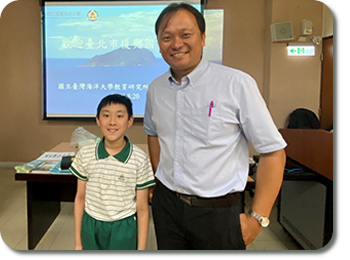
In my opinion, if you want to know more about this topic, there are two key factors. One is social education, another is home education. Social education can be divided into two parties: civil groups and corporations. Society of Wilderness is considered a civil group. In terms of corporations, when corporates make profit, they should give something back to the community and actively participate in marine education. Home education can involve learning and sharing with family members. If one is interested in marine related topics and areas, he or she can pursue an academic path in oceanography or aquaculture, and become influential teachers in the future.
| 3. | In your opinion, if we want to become a marine volunteer, how can we start? (Tzu-Ning) |
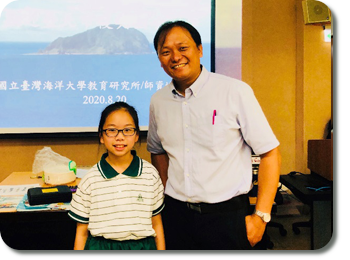
Volunteering is helping out others without any return. Before helping out others, first we must better ourselves in order to make valuable contributions. We can also learn how to take responsibility through participation in marine related activities. For those who want to become marine volunteers, I recommend the following options to get involved in marine environmental issues. For example, the “Hands-On Love Taiwan” beach clean-up event organized by Mr. Chen, Shin-Chu. Although Mr. Chen has only a high school diploma, against all odds, he has become a well-known beach cleaning expert. The National Museum of Marine Science and Technology and National Museum of Marine Biology & Aquarium also have plenty of marine resources and knowledge waiting to be discovered. Furthermore, you can also participate in marine education activities, sharpen language skills to communicate with volunteers from around the world, or join environmental social media (Line, Facebook) groups. The volunteers must continue to improve and sharpen their knowledge, skills, and attitudes.
| 4. | How to improve ocean literacy of citizens through education? (Chia-Kai) |
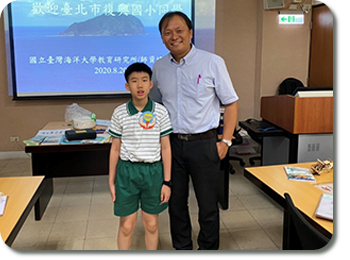
Ocean Literacy: the understanding of our influence on the ocean and the ocean’s influence on us (UN, 2020). We should enrich our knowledge of ocean and sharpen ocean research techniques, and establish ocean watch spirit. Get close to the ocean, love the ocean, and know the ocean, it's an endless cycle. By interacting with the ocean environment, we can get to know about the current condition and issues, establish emotional connection to the ocean, and understand the interaction between ocean and ourselves.
| 5. | Taiwan has very rich marine resources. We obtain food from the ocean, but at the same time we dump a lot of waste into it. Do you have any materials on marine culture and local stories that can be put into the textbooks, story books or picture books so that children throughout Taiwan can learn to respect the ocean from an early age? (Tzu-Chun) |
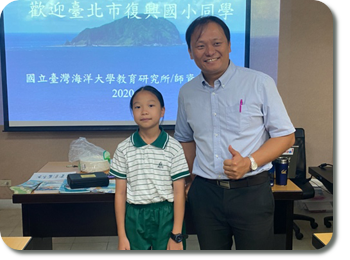
There are many picture books about oceans. Other than searching on the internet, you can find many books with related topics in the library. The Taiwan Marine Education Center hosts periodic marine science picture book competitions. If you have a chance to visit the Keelung Night Market, I highly recommend you to visit this local store called “Sea to See Bookafé”. It has a marine education section that has very interesting picture books. As most of the books contain scientific elements, you need to understand the science first, then you can think about how to make others understand it. From the script, structure, writing, and review by professionals, each step has scientific elements involved.
| 6. | The ocean is enormous and contains a sizable amount of aquatic animals. How can you know if there are changes in the amount of living species and ecological environment? (Hsin-Ai) |
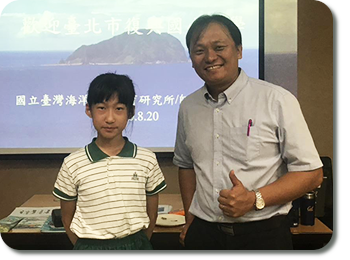
The measurement of marine fish is conducted in enclosed waters (within a parameter). If the parameter is too large, the measurement requires sampling technique. The sampling involves catching fish randomly in a smaller area that is proportionate to the total area, then based on the number of fish caught to make estimation of the total number. Measurement error can be reduced by increasing the number of samplings and a statistical parameter can be calculated. If we want to estimate the total number for a specific species, we can apply one of the following:
1.Fishery Report: This is basically using the amount of catches to estimate the number of fish in the fishery zones. Then we can further estimate the total number of fish in the area.
2.Sampling by Scientists: Taking samples from typical locations on Earth, collecting data, and estimating the possible number. The next step is to set the fishing route and select sampling points with each interval, use the same fishing net, follow exactly the same fishing process, and record the size of opening on the trawl net. Then we can get the quantity of every fish species per square kilometer.
| 7. | Based on the current environmental protection and marine education, what should be the first priority? (Yu-Chen) |
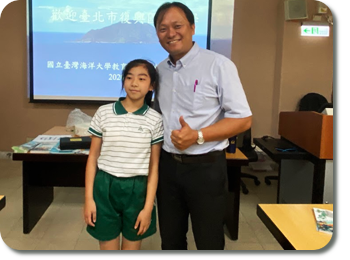
The goal of marine education is to establish and raise marine literacy. First to know the ocean, get close to the ocean, and then to love the ocean. We should get people to learn and know more about the ocean (know), through personal contact and interaction with the ocean (get close) to develop emotional attachment and responsibility to protect the ocean (love). All of these are parts of marine literacy. Marine literacy is not just knowledge in the books, it puts more emphasis on the actual practice in life. If everyone can start the practice from themselves and promote it to the people around them, everyone can become an educator of environmental protection.
| 8. | Between urban afforestation and ocean cleanup, which should be prioritized and why? (Bo-Hsiang) |
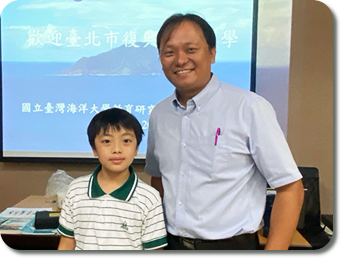
Both are important, so there is no prioritization required. The key question is “what have you accomplished?” If in your opinion that urban afforestation is important, then you should cherish every tree in the city, and perhaps plant a few more if possible. On the other hand, if you think ocean cleanup is more important, then you should spend more time and effort to know more about the ocean and related issues. You can also participate in beach cleanup activities. If everyone can spend more time on the topics they are interested in, they can enrich their knowledge and start accumulating professional expertise to make contributions to the environment.
| 9. | How to minimize the impact of tourism recreational fishing to the marine ecosystems so that the benefits outweigh the costs by significant margin? (Hao-Cheng) |
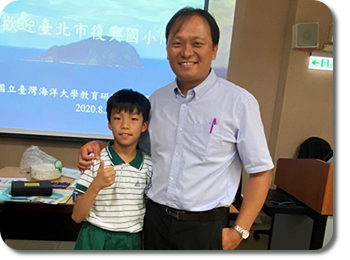
Ocean recreational fishing and tourism recreational fishing are very different. Ocean recreational fishing is converting traditional fishing into tourism activities. It used to be fishermen sharing their experience to the general public. Now, the tourism recreational activities are based on marine education to let participants to experience and see the beauty of the ocean. The participants can also learn the potential impacts humans can do to the ocean, which can lead to positive attitudes toward the ocean. By incorporating marine education into activities, tourism and recreational fishing can bring positive effects to the marine ecosystem.
In the interview, Professor Yen had said that elementary students can gain more insight on protecting the ocean environment through academic, social and home education. In terms of academics, the Ministry of Education has already planted the seed of marine education in the textbooks. Through school classes, environmental awareness can be gradually cultivated into children’s hearts. In terms of social education, you can witness the impact of garbage to the environment by participating in social groups’ activities, such as SOW’s periodic beach cleanups, seminars, and outdoor activities. In terms of home education, you can learn and share with family members.
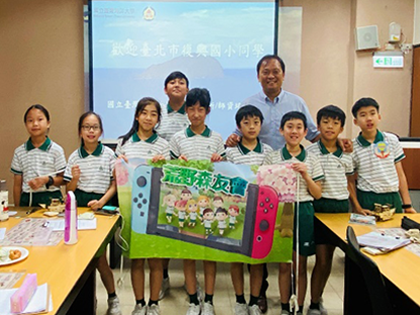
Source: Wilderness Crossing
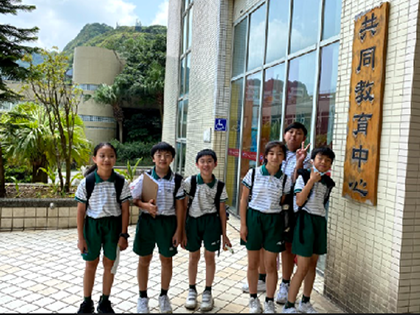
Source: Wilderness Crossing
Professor Yen encouraged us to participate in more ocean activities. Know, Get Close, and Love the ocean in an infinite cycle. Through actual participation in ocean activities, whether it’s tourism or recreational fishing, you get a chance to see the beauty of the ocean and the participants can receive marine education without them knowing. As long as you have the correct knowledge and concept of marine literacy, you can bring a positive effect to the marine ecological environment. The professor also encouraged us to carry an ocean notebook if we want to become the guardians of the ocean. When the notebook is full, it will become a story book with very rich contents.
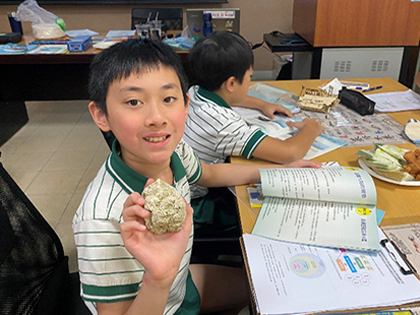
Source: Wilderness Crossing
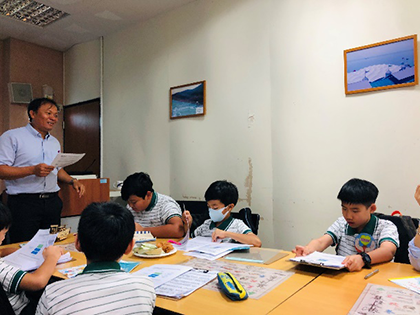
Source: Wilderness Crossing